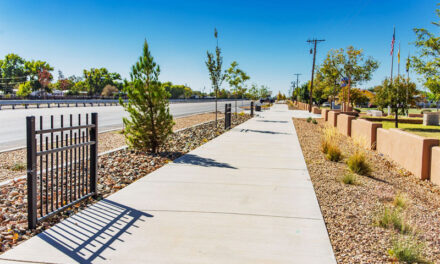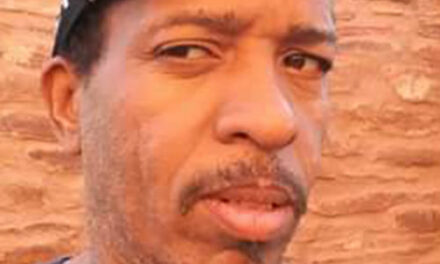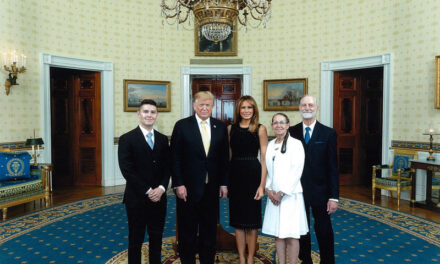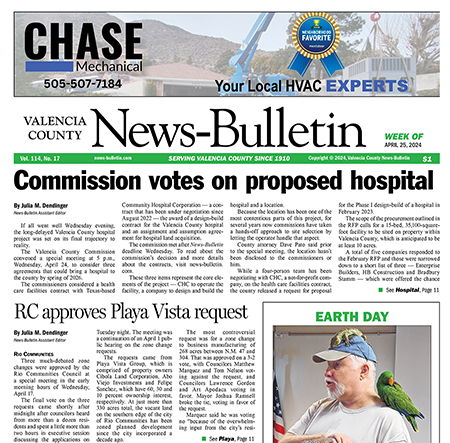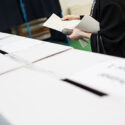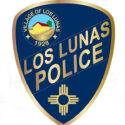BELEN — The Belen Public Library kicked off its summer reading program June 9 with a presentation about the legacy of Dr. Martin Luther King Jr. and how he has impacted the community.
The event featured a panel of local public figures, including artist Mike Moreno, Belen Municipal Judge Keith Norwood and Belen Fire Chief Charles Cox. The trio shared their experiences with racism and segregation, and how the teachings of MLK impact their lives.
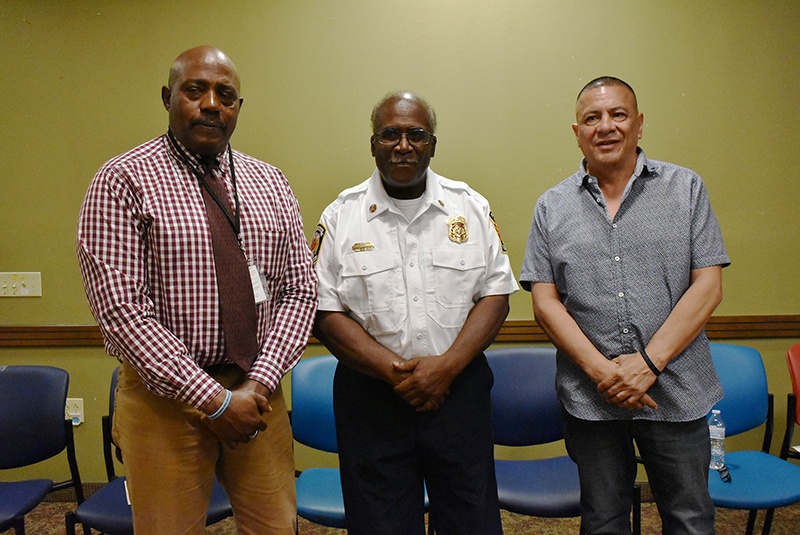
Felina Martinez | News-Bulletin photo
Pictured from left, Belen Municipal Judge Keith Norwood, Belen Fire Chief Charles Cox and artist Mike Moreno spoke about what influence Dr. Martin Luther King Jr. had on their lives.
Moreno recalled a particular moment from his childhood when his mother sent him to the store to pick up a few things.
“I was happily going along when a white boy came up. I said ‘hi’ and he said, ‘I don’t talk to people like you.’
“He called me a bad name. I didn’t know what to say or what to think, but it was one of the saddest days in my life,” Moreno recalled.
Moreno learned about MLK on television, and the civil rights leader became a big influence for him to treat others respectfully and the way you would want to be treated.
“Getting to visit his grave was a big honor, and we need to keep educating each other,” Moreno concluded.
Norwood took the stage next and spoke about growing up in Georgia and his experience attending segregated schools.
“We got the worst of everything. The other schools had a free lunch program — we didn’t have it. They gave us extra tickets, but everybody in that school was hungry,” Norwood said. “Only a few people could afford to pay for their own lunch, so most of us had to sit across from each other and watch the other people eat.”
Norwood said the end of segregation was the best thing this country could ever get.
“I will never forget in sixth grade, two years after segregation had ended, when me and my twin brother were going across the street, and this white man called coach Gardner asked if we wanted to play ball. He took the time out to teach me how to play baseball,” Norwood recollected.
“It doesn’t matter about the color; if there’s somebody in your life who’s lifting you up, let them lift you up. Just look at the heart of the person, that’s what MLK did.”
Norwood lived in the projects from 1966 to 1978, and said he had nothing growing up, but what MLK taught him is it’s not where you’re at, it’s where you want to be.
“A victim will not move from that spot. A victim will sit there and blame everybody about what’s going on,” said Norwod. “(MLK) taught us to persevere, to get up. When you get knocked down, you get up and keep going, and sooner or later your dreams will come true.”
Cox, originally from Maryland, was the final presenter. He went to an all-black school up until his senior year. Black people weren’t allowed to join the fire department until integration in 1965, Cox said.
“In 1966, I was the first black person in my county to join the fire department as a volunteer. When I worked my way into the paid department, I became the first battalion chief,” Cox said. “I was the first black firefighter in my department that moved to the rank of chief officer.”
Cox reminisced about his mother, cousins and aunts, who were very active in the civil rights movements in the ’60s and early ’70s.
“They went down to the March on Washington in 1963. I wanted to go, but no one knew what would happen, so I watched it on TV,” said Cox, who is a Vietnam veteran, and commander of the Chavez-Curran VFW Post 2387 in Belen.
“MLK has played a very important part in my life. I watched him when he first started, when he had the bus boycotts in Alabama and all those different marches,” said Cox.
A message inspired by MLK that Cox said he lives by is judging people not based on the color of their skin, but on the content of their character.
“I think that’s very important because back when there was segregation, as a black person you were not worth the same as a white person, even in the court systems, jobs and housing,” said Cox. “Even if you lived a block away from a white school, you were bused five miles away to a black school.”
Cox recalled how strange it felt growing up in his community during segregation. At a recreation program in his community, Cox said it didn’t matter if you were black or white, all the kids played ball together.
“But the next day, you went to a white school or black school and that’s just the way it was,” he said.
Cox was working at a fire station when MLK was assassinated. He said riots ensued and there were a lot of fires they had to put out that night.
“As you look back and contemplate all the things that you’ve been through, things that you suffered through and all your accomplishments, no matter what, I still love the U.S.,” said Cox. “I’m still an American and I still love my government; that’s never going to change.”
As a final thought for the audience to contemplate, Cox concluded with an important message instilled in him by MLK — nobody’s born racist, racism is taught.
Felina Martinez was born and raised in Valencia County. She graduated from the University of New Mexico in 2021. During her time at UNM, she studied interdisciplinary film, digital media and journalism. She covers the village of Los Lunas, Los Lunas Schools, the School of Dreams Academy and the town of Peralta.

